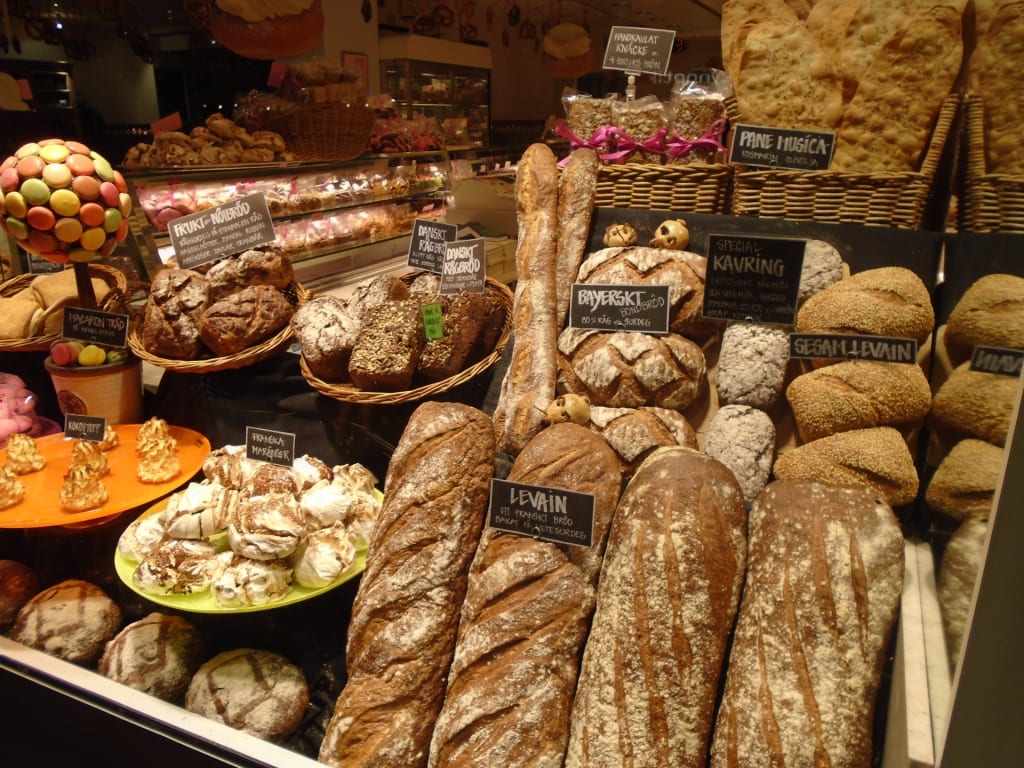
Who doesn't have an appreciation for bread? France, in particular, boasts a remarkable array of delicious bread. While sustenance extends beyond bread alone, a meal feels incomplete without it. At every street corner, bakeries churn out scrumptious, freshly baked loaves, adding to the allure. This level of freshness isn't as easily accessible to me, leading to questions about the stark disparity. Why does the readily available bread here differ so significantly? Why does the art of bread-making lag in the US? Allow me to illustrate this contrast. Let's rewind twelve hours, back in the US. I'm currently at a grocery store, capturing how a lot of us Americans obtain our bread. It's disheartening. A highlight is when they make plastic packaging seem steamy, conjuring the illusion of just-out-of-oven freshness, despite the reality that it was factory-produced weeks ago. "Made with real butter," they claim. Always choose Wonder Bread, they say. You'll be glad you did. The motive behind my bread purchase is to carry an example to France, possibly using it as a teaching prop or even a pillow, given its softness akin to a Novaform pillow. Some bagged bread contains ingredients that are forbidden in the EU. Now, back to France.
There's truly nothing more emblematic of America than Wonder Bread. While we acknowledge France's bread mastery and the US's lack thereof, there's more to the story. Bear with me as I delve into the heart of the matter. I believe that bread symbolizes a broader cultural phenomenon in the US, and that's precisely what I wish to discuss today: the origin of industrialized bread, its existence, and the efforts to transform it. I'll elaborate on this in a moment. So, why bread? Countless other topics could be explored, but bread emerges as the single most crucial prepared food in human history. Hence, it deserves our attention. In under a minute, I'll summarize thousands of years of bread's history, its chemistry, and its significance. Doubt my time limit? Watch this. Twelve thousand years ago, humans grasped the potential of cultivating wheat instead of solely foraging. Wheat, when ground, produced a powdery substance that, upon adding water, formed a stretchy, sugary goop. Airborne bacteria adored this sweet concoction, emitting gas as they dined. The trapped gas inflated the goop, akin to a balloon. The feasting and burping transformed it into a pillowy creation. Expose this to heat, and the newly formed bubbles solidified. All this, thanks to a single grass—wheat. "Cool, let's cultivate this grass extensively," humans proclaimed, laying the foundation for their civilization. This is the essence of bread, the oldest and most significant prepared food known to humanity. Over time, mastery of the bread-making process grew. In France, particularly, it evolved into a profound culinary culture. The legacy persists today, evident in the abundance of bakeries. France boasts 30,000 independent bakeries compared to the US's 3,000, despite the latter's larger population. Calculations reveal that France has 50 times more bakeries per capita. This stark contrast underscores their reverence for traditional, well-crafted bread.
In France, a remarkable 94% of regions reside within a five-minute radius of a bakery—a testament to their values. This emphasis extends beyond consumption; it's a way of life. Meals aren't hurried affairs, but cherished moments of connection. Boulangeries witness daily visits, fostering camaraderie. This cultural ethos starkly contrasts with the American experience, rooted in individualistic mechanization and industrialization. The automatic bread slicer of the 1920s typifies this trend. Fast-forward to the 1950s: America's bread underwent radical transformations, shedding nutrients for shelf life, softness, and uniformity. European traditionalists balked, leading to divergent bread cultures. Industrialization gave rise to a bread-like product, laden with additives forbidden in Europe. The US's preoccupation with convenience and mass production neglected the essence of authentic bread.
This phenomenon underscores broader American culture—prioritizing efficiency and convenience over heritage and quality. Yet, pockets of change emerge. Some US bakeries champion traditional methods, crafting artisanal bread that rivals European counterparts. However, this movement remains confined to urban centers, leaving industrialized bread accessible to most. The saga of Panera Bread encapsulates this transformation: from a beacon of quality to a corporate entity prioritizing scale and profit.
Does this matter? Am I simply a bread snob decrying American practices? There's more at stake—the difference transcends taste. Traditional bread's natural fermentation aids digestion, a process often omitted in the US's mechanized approach. Convenience and efficiency are admirable, but the focus on these often overshadows quality, community, and cultural heritage. Thankfully, change is afoot, with a growing movement of artisanal bakers. However, these endeavors remain a rarity compared to the widespread prevalence of industrialized bread. This incongruity is a source of frustration, a reminder that we ought to revisit our priorities.
About the Creator
Sam C.
I have passion in cooking and gardening. Food of all cultures, flowers and plants. Thinking what else I can enjoy doing, and this came along as my new hobby "Writing". I love watching movies and documentaries. Now it's time to "tell".





Comments (1)
As my travels have revealed to me, I notice other countries do not use additives like the USA. For example, In Egypt-Sweet Chili Doritos are made with: Corn Flour, Seasoning, and Salt......simple right? Go grab a bag in your local grocery store in the USA and you will find some friendly additives. You as a consumer are doomed from day 1 for the sake of profitability of a large multi-national company. You may also enjoy the following: https://vocal.media/feast/unleash-your-inner-chef-au1mh0bir Thank you for sharing your thoughts.